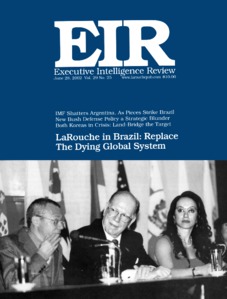LaRouche Visit to Brazil Features São Paulo Honor
by Gretchen Small
Lyndon H. LaRouche, Jr. was awarded honorary citizenship for São Paulo, by the City Council of that city of more than 18 million people, the third-largest in the world. In a week-long visit to Brazil, he gave four public addresses.
Integration of Nations Is Key in the Crisis
by Lyndon H. LaRouche, Jr.
LaRouche’s speech to the fifth “Argentina-Brazil, the Moment of Truth” meeting, held in São Paulo on June 14.
Seineldín From Prison, on Leadership
by Col. Mohamed Alí Seineldín (ret.)
Colonel Seineldín, a political prisoner and Argentine patriot, addresses the bi-national meeting by telephone.
Argentine Warns Brazil Of ‘Moment of Truth’
by Col. Adrian Romero Mundani
‘The Most Profound Crisis May Be a Gift’
by Lyndon H. LaRouche, Jr.
LaRouche’s speech to the Commercial Association of São Paulo on June 13, with the discussion following.
Economics
IMF Shatters Argentina, As Pieces Strike Brazil
by Cynthia R. Rush
A few decades ago, Argentina was one of Ibero-America’s wealthiest nations, with high living standards, a skilled labor force, 99% literacy, and impressive scientific and technological infrastructure. Today, after 15 years of IMF dictates, an astounding 51.4% of its population is officially classified as poor.
IMF’s Anoop Singh: Subversion in Asia
by Michael Billington
The International Monetary Fund’s new potentate for Ibero-America will bring to that continent the devastation that he brought earlier to Asia.
Who’s Blocking Out the Sunshine in Korea?
by Kathy Wolfe
The government of South Korean President Kim Dae-jung is in disarray, and the President’s opponents are trying to rip up his rapprochement with the North.
Sharon Is Destroying Israel’s Broken Economy
by Dean Andromidas
Ranks of Wall Street’s ‘Misfortune 500’ Grow
by Arthur Ticknor
Germany Flight Capital Amnesty, Just To Balance Budget?
by Rainer Apel
‘Look Ma, No Trains or Planes’ in U.S.
by Anita Gallagher
First U.S. Maglev on Track in Virginia
Science & Technology
Australian FDR-Era Engineer: Let’s Resume Great Projects
by Prof. Lance Endersbee
Civil engineer Prof. Lance Endersbee discusses his personal experience training with the cadres from FDR’s great infrastructure projects, and some breakthroughs being made at the forefront of Earth science.
International
Afghan Loya Jirga: Too Much Interference, Little Achieved
by Ramtanu Maitra
The grand council was used as a rubber stamp to back the candidate chosen by Washington, the Afghan Interim Chairman, Hamid Karzai, as President. Nothing has been solved politically, and no stable government emerged.
The Loya Jirga’s History
Privatization Battle Crumbles Peru Govt.
by Sara Madueño
Revisiting Israel’s Nuclear Option
by Dean Andromidas
‘Pedophilia Scandals’: Cardinal Rodríguez Rips Attack on Church
by Claudio Celani
Why Canada’s Finance Minister ‘Was Resigned’
by Gilles Gervais
Paul Martin is gone, but his policies will remain, says Prime Minister Chrétien.
International Intelligence
National
New Bush Defense Policy Paves the Way for Strategic Blunder
by William Jones
The new assertion of a right to conduct pre-emptive military strikes against states and terrorist groups intent on developing weapons of mass destruction, aims to provide the basis for an early pre-emptive strike against Iraq. But the adoption of a utopian military policy does not at all guarantee its success.
Homeland Security Bill Is on a Fast Track
by Carl Osgood
Jewish Scholars Speak Out: Call To Kill Terrorists’ Families Is ‘Desecration’
by Michele Steinberg
The murderous policy enunciated by attorney Nathan Lewin has generated a firestorm of protest from Jews internationally.
Plans To Attack Iraq Make Saudis Target, Too
by Suzanne Rose
Congressional Closeup
by Carl Osgood
Departments
Editorial
AIDS Policy Adds Up to Genocide.
Correction
In Richard Freeman’s article on the U.S. Housing Debt Bubble, EIR, June 21, by an editor’s error, $400 billion was incorrectly given as a figure for 60% of home equity loans made each year. In fact, $400 billion represents 60% of all home equity loans outstanding.



